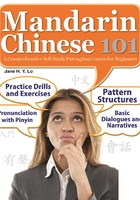
Dialogue II

Vocabulary

Notes
1 “Nǐ hǎo!” is a popular form of greeting. It can be used in the morning, in the afternoon or in the evening, with anybody. The respond from the person addressed is also “Nǐ hǎo!”.
2 “Nǐ hǎo ma?” is a greeting in the form of a question, and it is usually answered with“Wǒ hěn hǎo.” There are many forms of interrogative sentences in Chinese. One of the most common forms is to add “ma” at the end of a declarative sentence. The sentence doesn't require any change in the word order.
3 Another form of interrogative sentence in Chinese is to add “ne” after the noun and pronoun. It is similar to the English sentence “and you…?” or “what about…?” the predicate is omitted in the sentence. However, it can be understood through the context.
4 In Pǔtōnghuà, a personal pronoun can be directly put before a noun when describing family relationships. E.g.
“nǐ māma (your mother)” and “nǐ tàitai (your wife)” etc.
5 yě, hěn, dōu are all adverbs, and they always precede the predicative verb or predicative adjective (stative verb). E.g.
Wǒmen yě dōu hěn máng. When both yě and dōu are used to modify the same predicate, yě should be put before dōu.